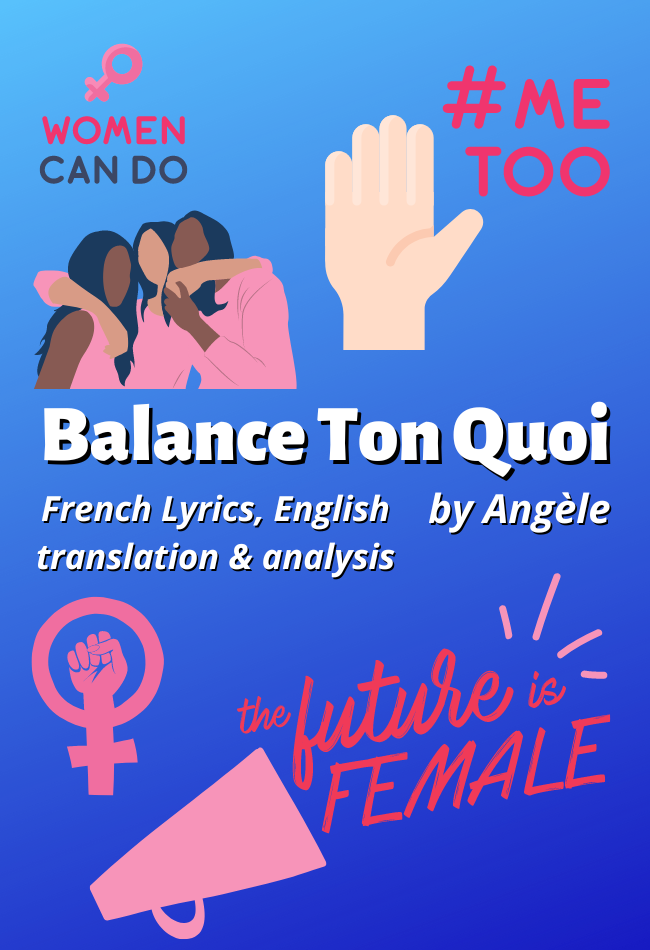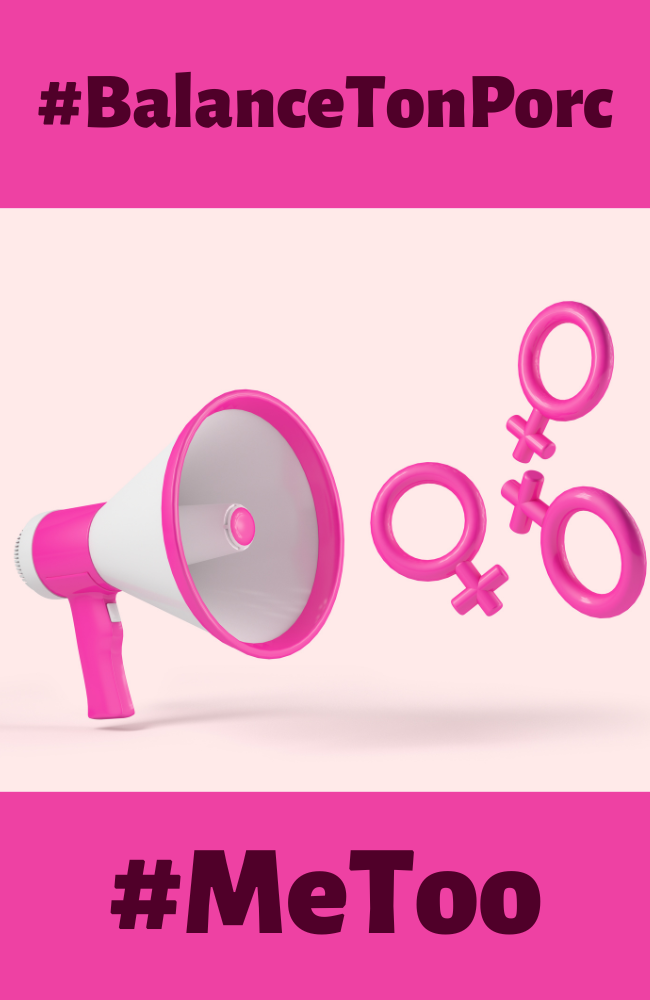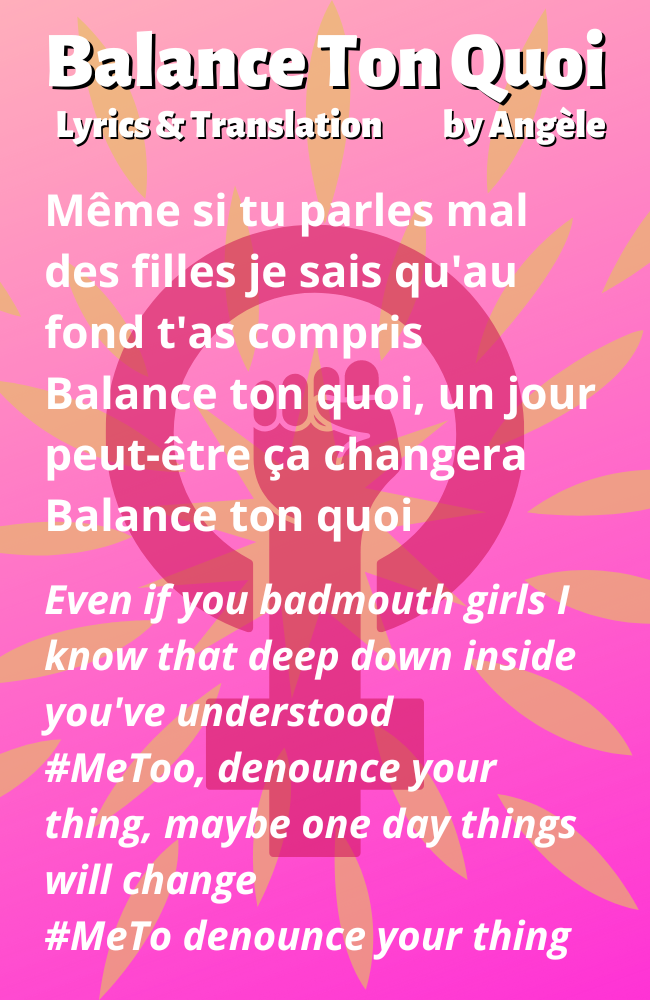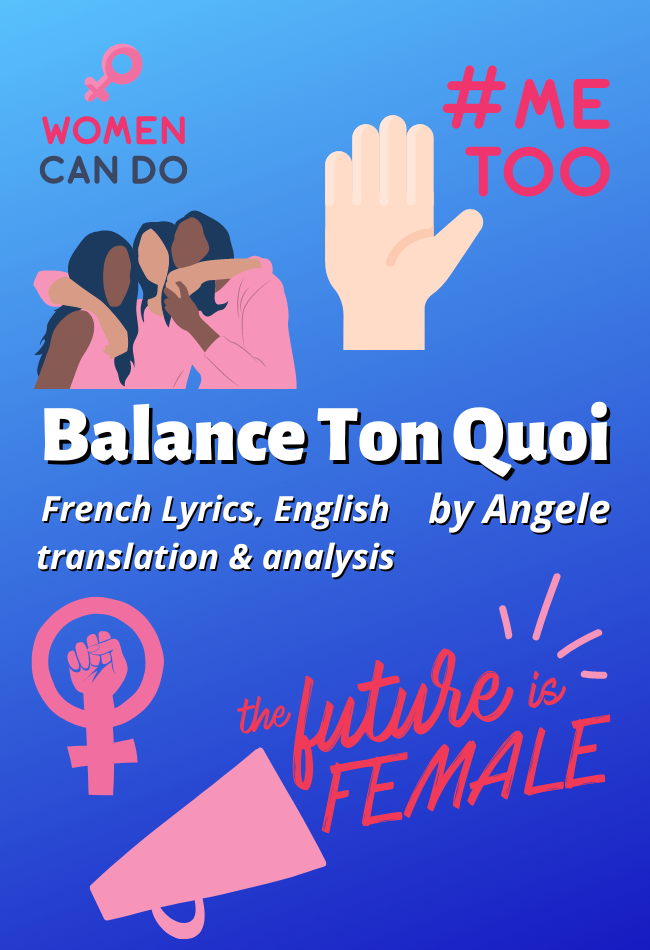“Balance Ton Quoi” (Meaning in English: Denounce Your Thing; Pronunciation: balɑ̃s tɔ̃ kwa) is a hit song by Belgian singer Angèle. Released on the album Brol in 2019, the song’s lyrics are about sexism and the #MeToo movement. This post offer indepth explanations of the lyrics vocabulary and grammar.

Balance Ton Quoi synopsis
Song title explanation
(See bottom of post to hear song.)
The French song title, “Balance Ton Quoi”, is a play on words on the French name for the #MeToo movement: “Balance Ton Porc“, meaning denounce or “snitch out your pig”.
The French name for the #MeToo movement came about when journalist Sandra Muller asked women to share their stories about sexual harassment in 2019. “Pig” makes reference to the film producer and predator Harvey Weinstein being called “The Pig” at the Cannes Film Festival.
The word “quoi“ translates to “what” in French. For the song’s title, however, we translated “quoi” to “thing” as the expression “n’importe quoi” translates to “anything” and the French reference to “porc” (pig) suggests that the sexually offensive man is a “thing” to be denounced.
Lyrics in a nutshell
In the lyrics of “Balance Ton Quoi”, Angèle is essentially telling off the stereotypical male sexist. In the first verse so the song, she touches on how modern day wrap music is full of sexist slurs towards women (De toutes les chattes ça parle mal, Bad mouthing all p*ssies) and that women should now speak their minds (Une fille qui l’ouvre ça serait normal).
In the lines that follow she tells repeats the name of the #MeToo movement and title of the song using the word “quoi” rather than “porc” (see above) (Balance Ton Quoi) and sings for men to “go f*** themselves” (Donc laisse-moi te chanter, D’aller te faire en, hmm).
In the lines that follow, she makes it a point to touch on “dumb blond” stereotypes: “For a pretty girl you’re not to stupide” (Pour une fille belle t’es pas si bête).
In the final lines she expresses her hope for change and suggests that men are deluding themselves: (Un jour peut-être ça changera, Tu sais très bien quand t’abuses; Maybe one day things will change, You know very well when you’re fooling yourself”.
Classroom discussion summary
At the two-minute mark in both the song and video (see below), Angèle hosts a mock discussion group where older adolescent males ask her specific questions regarding sexual conduct with women. All of the questions are common sense in nature and Angèle makes it a point to state the obvious in her answers.
For example, one man asks, “Quand une fille dit non, j’ai l’impression que souvent ca s’entend que c’est….?; When a girl says no, I have the impress that often it’s understood that…”. Angèle immediately interjects, “C’est non! (it’s no!)”.
The same male goes on to ask, “Quand une fille dort, on sait pas, du coup, si on peut, si on peut pas. Et du coup je me dit peut-être dans le doute on peut tenter; When a girl is sleeping, you don’t know if you can or you can’t. So, I tell myself when in doubt, you can try.”. Angèle then replies, “Non, si elle dort, tu la laissez dormier” (No, if she’s sleeping, let her sleep).
There are several women in the room and the men can be seen clearly ignoring them. At a certain point one of the women says, “Calmez-vous, je pense que…(calm down, I think that…) and the men cut her off completely. The men can also be seen high-fiving each other and completely ignoring the woman sitting between them.
At the end of the video, Angèle can be seen putting her head down as if to express disbelief in the mens’ arrogance and ignorance.
Video synopsis
In the beginning of the video (see below), Angèle can be seen wearing a wedding dressed an appearing like a figurine holding a real cat. She’s also wearing heart-shaped signs saying “go f*** youself” in English. She ends the initial verse by giving the camera the finger.
In the video’s next scene, Angèle appears as a judge in a court with a wide variety of men and women witnesses. She is seen holding a TV showing images of hands groping a woman who also starts singing. Angèle is then seen laying on some grass and has fake armpit hair put under her arms.
She can then be seen back in the court room holding a sign that reads in English, “A Hundred Poems To Learn Respect” and an office cartoon of man harassing a woman with her saying “NO!”. The cartoon then shows figures on pogo sticks jumping on the letters of the word “sexism”.
The video then goes on to show the scene with the mock classroom session (see explanation above). The school’s entrance shows a sign saying “Anti-Sexism Academy, Everybody Welcome; empathy, communication” in English.
The next scene shows a group of men running with fake breasts and a group of women led by Angèle cheering them on. Then, the video shows Angèle and an other woman standing in front of a chalkboard with the word written “this is not consent” in English and men the watching. The other woman’s shirt reads, “Feminist in progress” in English.
The end of the video shows Angèle dressed as a judge singing and dancing with other women of the “Anti-Sexism Academy”. At the very end of the video, one of the men from the classroom discussion says, “Et ce qu’il faut bien comprendre, c’est quand une fille dit non, c’est non; And what you need to understand is that when a girl says no, it’s no”.

Lyrics analysis
In the following section we selected words and grammar points form the lyrics which we feel offer interesting insights to learning French.
Ils parlent tous comme des animaux
This line translates to “They all speak like animals”. “Ils parlent” (they speak) is the third-person plural (ils, elles) form of the verb parler (to speak). When followed by the preposition “de”, “parler de” means “to talk [or speak] about”. The singular form of animal is “un animal“ and the plural form is “des animaux”.
De toutes les chattes ça parle mal
This line translates to “Bad mouthing all p*ssies”. The expression “parler mal de” means “to bad mouth”. “Tous” means “all” or “everything”. In this line, “toutes” is used because the noun “chattes” is feminine-plural. The word “chat” means cat in French. In the feminine form, “chatte“ is slang from “vagina”.
2018 j’sais pas c’qui t’faut
This line translates to “I know what you need in 2018”. “J’sais pas” is a shortening of “je ne sais pas” (I don’t know). There are two verbs for “to know” in French: “savoir” and “connaître”.
“Ce que” is an indefinite relative pronoun, meaning “what”, in the context of “what you need”. In this line, “ce que” appears as “ce qui” as it’s really a shortening of “ce qu’il te faut” (what you need). “Il faut“ has many usages but it’s underlying meaning is “it’s needed” or “it’s necessary”.
The “t'” in this line is a shortening of “te” and can translate to “you”, “at you” and “to you”. We cover the usage of “te” on our page covering ways to say “you” in French.
Mais je suis plus qu’un animal
This page translates to “But I’m more than an animal”. “Mais“ means “but” in French. “Plus que” means “more than”.
J’ai vu qu’le rap est à la mode
This line translates to “I saw that rap is all the rage”. “J’ai vu” is the passé composé (a French past tense used for past events which occurred at specific times) of “voir” (to see). “Est” is the is the third-person singular (il, elle, on) form of “être“ (to be).
The expression, “à la mode“ means “in style” or “fashionable”. However, making reference to Claudia Elena’s video, we translated “à la mode” to all the rage.
Et qu’il marche mieux quand il est sale
This line translates to “And it works better when it’s dirty”, referring to the dirtiness modern day rap lyrics. “Et que” means “and that”. The verb “marcher“ means to “to walk” and “to function [or work]).
“Mieux” means better. We cover this word on our comparisons page. The word “quand“ means “when” in French. “Sale“ is the adjective for dirty.
Une fille qui l’ouvre ça serait normal
This line translates to “A girl should speak her mind”. The literal translation of a the line is: “A girl who opens it that would be normal”. We went with our translation following the lead of Claudia Elena’s video.
“Serait” is the third-person singular form of “être” (to be) in the conditional tense, which is used to express “would” and hypothetical situations.
Même si tu parles mal des filles je sais qu’au fond t’as compris
This line translate to “Even if you bad mouth girls I know that deep down inside you’ve understood”. “Fond“ translates to both “back” and “bottom”.
The expression “au fond de” in the context of this line means “deep down inside”. “T’as compris” is a shortening of “tu as compris” and is the passé composé of comprendre (to understand).
Balance ton quoi, un jour peut-être ça changera
This line translates to #MeToo, denounce your thing, maybe one day things will change”. “Jour” translates to “day” as in “bonjour” and “un jour” translates to both “one day” or “some day”. “Peut-être“ means “maybe” and “changera” is the future tense of “changer” (to change).
The word “ça” in French translates to both “it” and “that” and use used to refer back to a previously mentioned topic of idea. In the context of this line and song, “ça” most likely refers back to the way men treat women and sexism.
Donc laisse-moi te chanter
This line translates to “So let me sing to you”. “Donc” means both “so” and “therefore”. A synonym for “donc” in the context of this line is “alors“ (so). “Laisser“ means both “to let” and “to allow”. “Te chanter” can translate to both “sing you” and “sing to you”.
D’aller te faire en, hmm
This line translates to “Go f*** mmm yourself”. This is line is a very clever shortening of the vulgar French expression, “Va te faire en**ler“, whcih means “go f*** yourself”. By singing “faire en…mmm”, what Angele is saying is very clear to the French listener.
Ouais j’passerai pas à la radio
This line translates to “Yeah, I won’t be on the radio”. “Ouais“ is slang for “yes” in French and means “yeah”. “Ne passerai pas” means “won’t be on”. This phrase uses the most basic French negation rule: “ne + verb + pas”.
The expressions “passer a la radio” and “passer à la télé” means “to be on the radio” and “to be on TV.
Parce que mes mots sont pas très beaux
This line translates to “Because my words aren’t very nice”. The adjective “beau” means “beautiful“. But, this the context of this line we’ve gone with the translation “nice”.
Les gens me disent à demi-mot
This line translates to “People tell me without having to spell things out that”. “Gens“ means “people” and is always a plural noun. The “me” in this line is a relative pronoun and means “me” or “to me”. This page covers various way of saying “me” in French.
The expression “dire à demi-mot“ translates literally to “to say by half-word” and really means to express a thought or idea without having to spell out all the details.
Pour une fille belle t’es pas si bête, Pour une fille drôle t’es pas si laide
These two lines translates to “For a pretty girl you’re not to stupide, For a funny girl you’re not to ugly”. “Pour” means “for” in French.
“T’es pas” is a snorting of “tu n’est pas” (you are not). “Si” in the context of this sentence “too”. “Si” can also mean “if” and “yes” in French in certain contexts. The adjective “bête” translates “stupid” in the context of this line but can also mean “silly”.
Tes parents et ton frère ça aide
This line translates to “It helps with your parents and brother”. This page on our site covers French family vocabulary.
Oh, tu parles de moi, C’est quoi ton problème?
These lines translate to “Oh, you’re talking about me, What’s your problem?”. “C’est quoi” translates to “what is” and is seen as informal language. “Quel est ton problème?” is a slighly more polite way of asking, “What is your problem?”.
J’ai écrit rien qu’pour toi le plus beau des poèmes
This line translates to “I wrote a beautiful poem for you”. This line is meant to be ironic as in the singer is telling off the male misogynist.
This was a difficult line to translate. The structure “ne + verb + rien” means “nothing” or “anything” and “ne + verb + que” means “only”. A more direct translation for this line could be “I wrote for you nothing but the most beautiful of poems”.
Y a plus d’respect dans la rue
This line translate to “Maybe one day things will change”. “Y a” is a shortening if “il y a“, which means “there is” and “there are”. The construction “il y a plus de + noun” means “there is more + noun”.
Tu sais très bien quand t’abuses
This line translates to “You know very well when you’re fooling yourself”. The reflexive verb (a verb where the subject is also the object) “s’abuser“ means to “fool” or “deceive” yourself.

Balance Ton Quoi – French Lyrics & English Translation
Ils parlent tous comme des animaux
De toutes les chattes ça parle mal
2018 j’sais pas c’qui t’faut
Mais je suis plus qu’un animal
J’ai vu qu’le rap est à la mode
Et qu’il marche mieux quand il est sale
Bah faudrait p’t’être casser les codes
Une fille qui l’ouvre ça serait normal
They all speak like animals
Bad mouthing all p*ssies
I know what you need in 2018
But I’m more than an animal
I saw that rap is all the rage
And it works better when it’s dirty
A girl should speak her mind
Balance ton quoi
Même si tu parles mal des filles je sais qu’au fond t’as compris
Balance ton quoi, un jour peut-être ça changera
Balance ton quoi
Denounce your thing (#MeToo)
Even if you bad mouth girls I know that deep down inside you’ve understood
#MeToo, denounce your thing, maybe one day things will change
#MeToo
Donc laisse-moi te chanter
D’aller te faire en, hmm
Ouais j’passerai pas à la radio
Parce que mes mots sont pas très beaux
So let me sing to you
Go f*mmm yourself
Yeah, I won’t be on the radio
Because my words aren’t very nice
Les gens me disent à demi-mot
Pour une fille belle t’es pas si bête
Pour une fille drôle t’es pas si laide
Tes parents et ton frère ça aide
Oh, tu parles de moi
C’est quoi ton problème?
J’ai écrit rien qu’pour toi le plus beau des poèmes
People tell me without having to spell things out that
For a pretty girl you’re not to stupide
For a funny girl you’re not to ugly
It helps with your parents and brother
Oh, you’re talking about me
What’s your problem?
I wrote a beautiful poem for you
Laisse-moi te chanter
D’aller te faire en, hmm
Ouais j’s’rai polie pour la télé
Mais va te faire en, hmm
Balance ton quoi
Balance ton quoi
Balance ton quoi
Let me sing to you
To go f*mmm yourself
Yeah, I’ll be polite for TV
But go f*mmm yourself
#MeToo denounce your thing
#MeToo denounce your thing
#MeToo denounce your thing
Un jour peut-être ça changera
Y a plus d’respect dans la rue
Tu sais très bien quand t’abuses
Balance ton quoi
Balance ton quoi
Maybe one day things will change
There’s no more respect in the streets
You know very well when you’re fooling yourself
#MeToo denounce your thing
#MeToo denounce your thing
Laisse-moi te chanter
D’aller te faire en, hmm
Ouais j’passerai pas à la radio
Parce que mes mots sont pas très beaux
Laisse-moi te chanter
D’aller te faire en, hmm
Ouais j’s’rai polie pour la télé
Mais va te faire en, hmm
Balance ton quoi
Balance ton quoi
Balance ton quoi
Let me sing to you
Go f***mmm yourself
Yeah, I won’t be on the radio
Because my words aren’t very nice
Let me sing to you
Go f***mmm yourself
Yeah, I’ll be polite for TV
But go f**** yourself
#MeToo denounce your thing
#MeToo denounce your thing
#MeToo denounce your thing
Même si tu parles mal des filles je sais qu’au fond t’as compris
Balance ton quoi, un jour peut-être ça changera
Balance ton quoi
Even if you badmouth girls I know that deep down inside you’ve understood
#MeToo, denounce your thing, maybe one day things will change
#MeTo denounce your thing
Listen to “Balance Ton Quoi”
The official YouTube video for “Balance Ton Quoi” has over 106 million views.
You can also listen on Spotify:
Become an expert in French song lyrics
One of the most effective ways to learn French is by studying song lyrics. For Belgian singer Angèle, we’ve also analyzed the lyrics of “Bruxelles Je T’aime“ (Brussels I Love You). For French singer Indila, we’ve analyzed the lyrics of “Tourner Dans Le Vide“, “Ainsi Bas La Vida“, “Dernière Danse“, “S.O.S.“ and “Love Story“. For Belgian singer Stromae, we’ve analyzed the lyrics of “L’enfer“, “Santé“, “Mon Amour“, “Alors On Danse“, “Papaoutai“, “Tous Les Mêmes“ and “Formidable“.

